There is no ambiguity about Israel causing Gaza to suffer occupation, apartheid and genocide. To counter Israeli denialism, here is a short primer on why these terms are accurate.
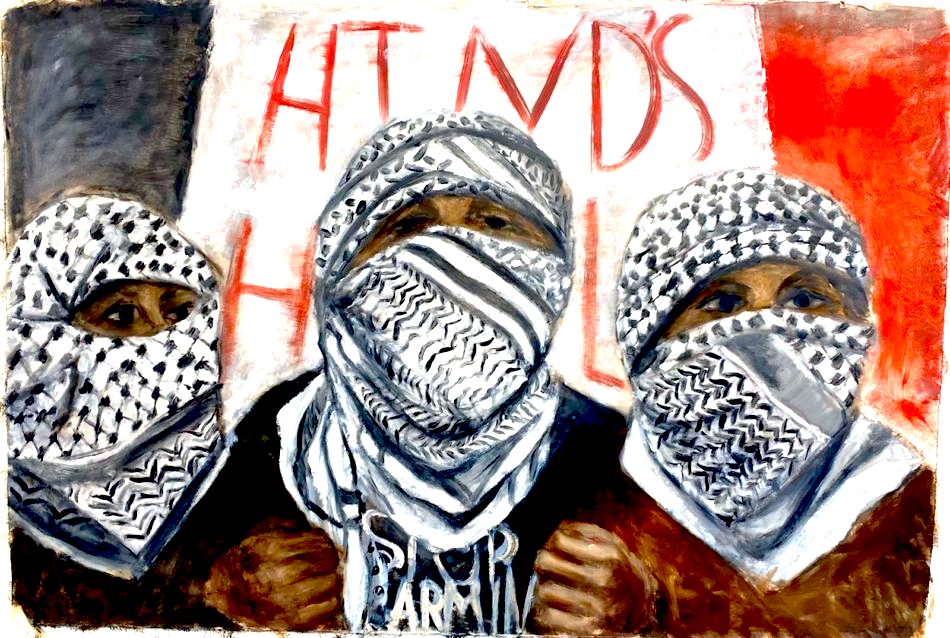
Malak Mattar, Palestine, “Hind’s Hall,” 2024. (Via Tricontinental: Institute for Social Research)
By Vijay Prashad
Tricontinental: Institute for Social Research
 In a chapter from Frantz Fanon’s Black Skin, White Masks (1952), called “The Fact of Blackness,” Fanon writes about the despair that racism produces, the immense anxiety about living in a world that has decided that certain people are simply not human or not sufficiently human.
In a chapter from Frantz Fanon’s Black Skin, White Masks (1952), called “The Fact of Blackness,” Fanon writes about the despair that racism produces, the immense anxiety about living in a world that has decided that certain people are simply not human or not sufficiently human.
The lives of these people, children of a lesser god, are assigned less worth than the lives of the powerful and the propertied. An international division of humanity tears the world into pieces, throwing masses of people into the fires of anguish and oblivion.
What is happening in Rafah, Gaza’s southernmost city, is ghastly. Since October 2023, Israel has ordered 2.3 million Palestinians in Gaza to move southwards as the Israeli armed forces have steadily moved their gunsights across the Wadi Gaza wetlands down to the edge of Rafah. Kilometre by kilometre, as the Israeli military advances, the so-called safe zone moves further and further south.
In December, the Israeli government claimed, with great cruelty, that the tent city of al-Mawasi (west of Rafah, along the Mediterranean Sea) was the new designated safe area.
A mere 6.5 square kilometres (half the size of London’s Heathrow airport), the supposed safe zone within al-Mawasi is nowhere near large enough to house the more than one million Palestinians who are in Rafah.
Not only was it absurd for Israel to say that al-Mawasi would be a refuge, but — according to the laws of war — a safe zone must be agreed upon by all parties.
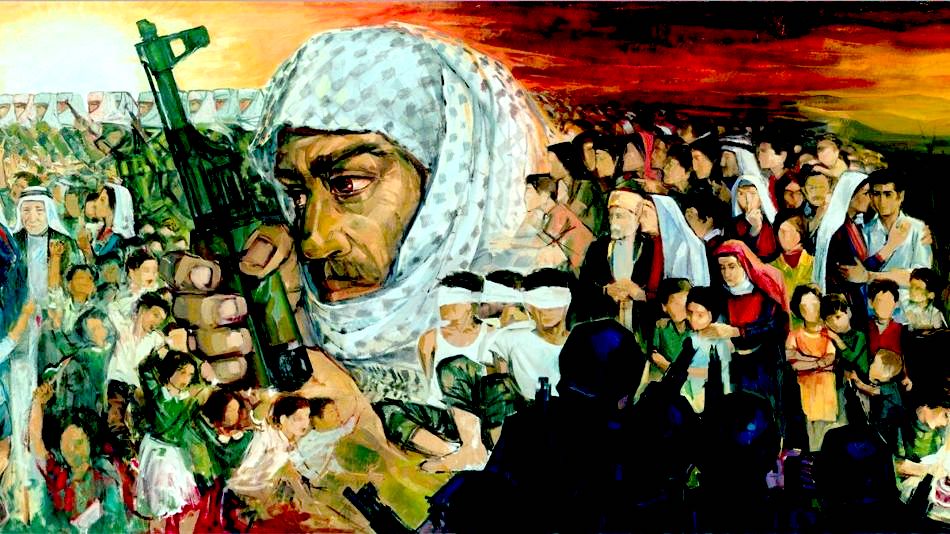
Ismail Shammout, Palestine, “Odyssey of a People,” 1980. (Via Tricontinental: Institute for Social Research)
“How can a zone be safe in a war zone if it is only unilaterally decided by one part of the conflict?” asked Philippe Lazzarini, the commissioner-general of the U.N. agency for Palestinian refugees (UNRWA); “It can only promote the false feeling that it will be safe.” Furthermore, on several occasions, Israel has bombed al-Mawasi, the area it says is safe.
On Feb. 20, Israel attacked a shelter operated by Doctors Without Borders/Médecins Sans Frontières, killing two family members of the organisation’s staff.
On May 13, an international U.N. staff member was killed after the Israeli army opened fire on a U.N. vehicle, one of the nearly 200 U.N. workers killed in Gaza in addition to the targeted assassination of aid workers.
[On May 26, an Israeli airstrike in Rafah killed at least 45 civilians, which Israeli Prime Minister Benjamin Netanyahu now tries to claim was a “tragic mistake.” The attack, which burned mostly women and children alive, took place two days after the International Court of Justice ordered Israel to stop its Rafah attack.]
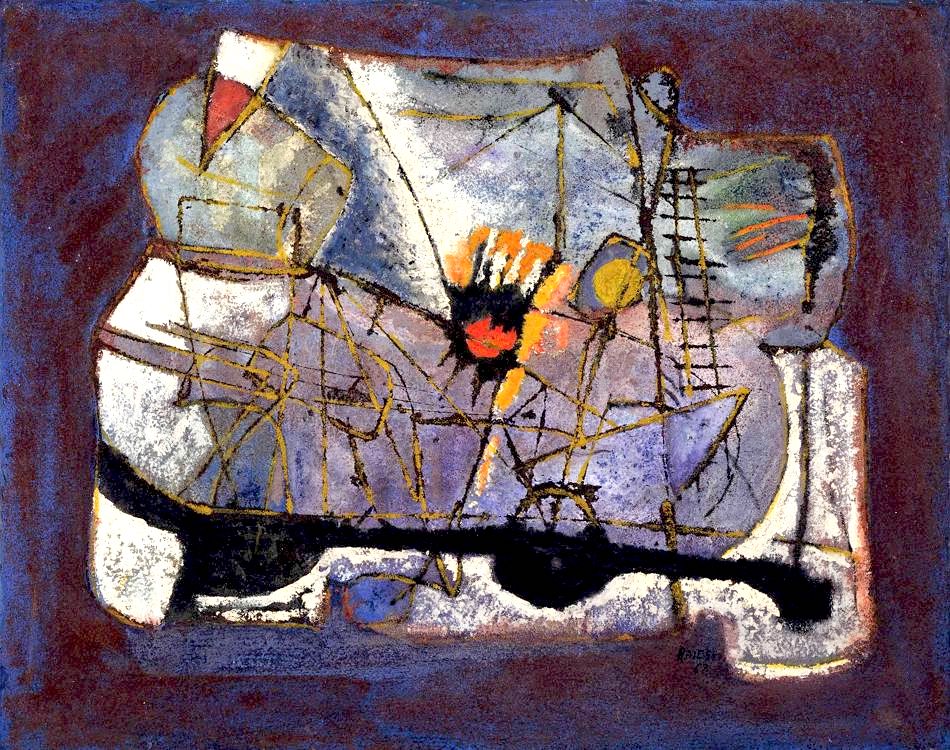
Aref El-Rayyes, Lebanon, untitled, 1963. (Via Tricontinental: Institute for Social Research)
Not only has Israel begun to bomb Rafah, but it hastily sent in tanks to seize the only border crossing through which aid dribbled in on the few trucks a day that were allowed to enter. After Israel seized the Rafah border, it prevented the entry of aid into Gaza altogether.
Starving Palestinians has long been Israeli policy, which is of course a war crime. Preventing aid from entering Gaza is part of the international division of humanity that has defined not only this genocide, but the occupation of Palestinian land in East Jerusalem, Gaza and the West Bank since 1967 and the system of apartheid within the borders defined by Israel following the 1948 Nakba or “Catastrophe.”
Three words in this sentence are fundamentally contested by Israel: apartheid, occupation and genocide. Israel and its Global North allies want to claim that the use of these words to describe Israeli policies, Zionism, or the oppression of Palestinians is tantamount to anti-Semitism.
But, as the United Nations and numerous respected human rights groups note, these are legal descriptions of the reality on the ground and not moral judgments that are made either in haste or out of anti-Semitism. A short primer on the accuracy of these three concepts is necessary to counter this denial.
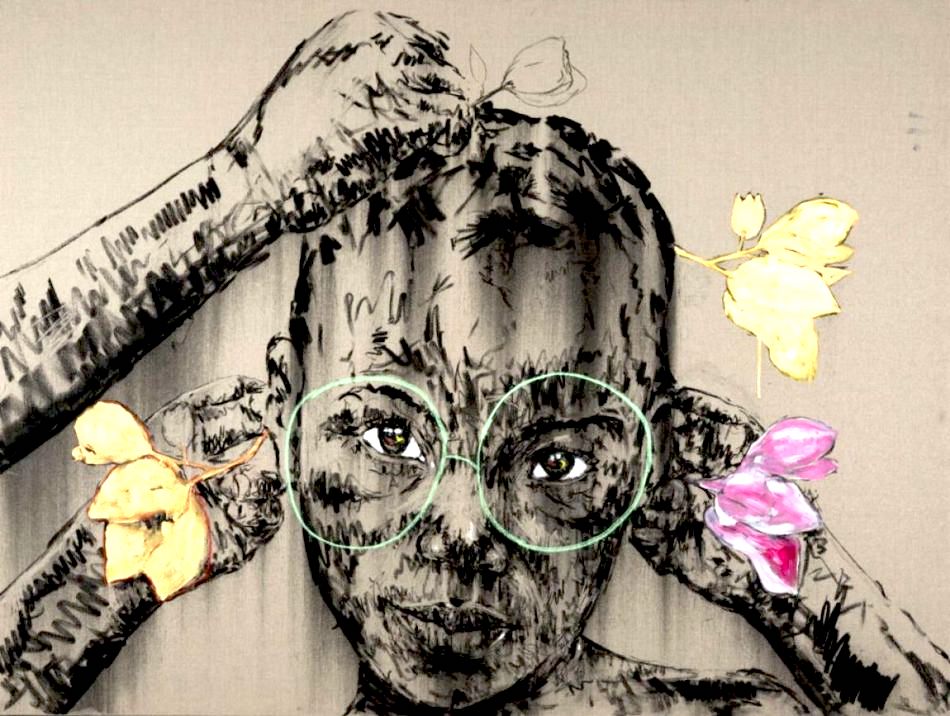
Nelson Makamo, South Africa, “Decoration of the Youth,” 2019. (Via Tricontinental: Institute for Social Research)
Apartheid. The Israeli government treats the Palestinian minority population within the borders defined in 1948 (21 percent) as second-class citizens. There are at least 65 Israeli laws that discriminate against Palestinian citizens of Israel. One of them, passed in 2018, declares the country a “nation state of the Jewish people.”
As the Israeli philosopher Omri Boehm wrote, through this new law, the Israeli government “formally endorses” the use of “apartheid methods within Israel’s recognised borders.” The United Nations and Human Rights Watch have both said that Israel’s treatment of Palestinians falls under the definition of apartheid. The use of this term is entirely factual.
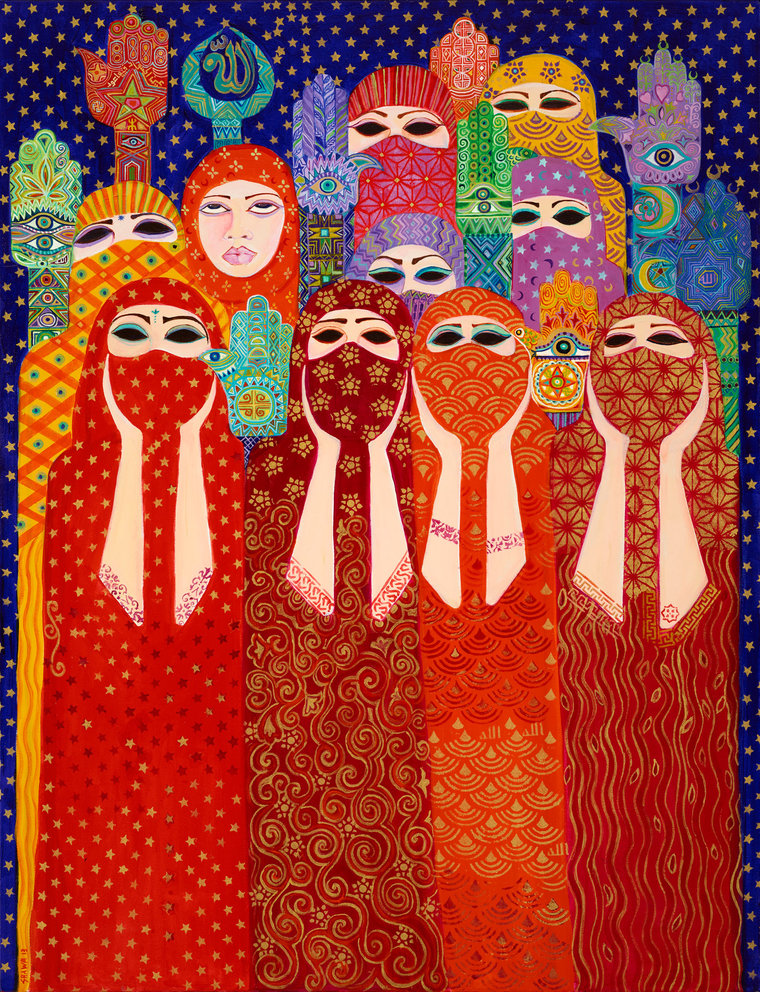
Laila Shawa, Palestine, “The Hands of Fatima,” 2013. (Via Tricontinental: Institute for Social Research)
Occupation. In 1967, Israel occupied the three Palestinian territories of East Jerusalem, Gaza and the West Bank. From 1967 to 1999, these three areas were referred to as part of the Occupied Arab Territories (which at different times also included Egypt’s Sinai Peninsula, Syria’s Golan region and southern Lebanon).
Since 1999, they have been termed the Occupied Palestinian Territory (OPT). In U.N. documents and at the International Court of Justice, Israel is referred to as the “occupying power,” which is a term of art that requires certain obligations from Israel toward those whom it occupies.
Although the 1993 Oslo Accords set up the Palestinian Authority, Israel remains the occupying power of the OPT, a designation that has not been revised.
An occupation is identical to colonial rule: it is when a foreign power dominates a people in their homeland and denies them sovereignty and rights. Despite Israel’s military withdrawal from Gaza in 2005 (which included the dismantling of 21 illegal settlements), Israel continued to occupy Gaza by building a perimeter fence around the Gaza Strip and by policing the Mediterranean waters of Gaza.
Annexation of parts of East Jerusalem and the West Bank as well as the punctual bombing of Gaza are violations of Israel’s obligation as the occupying power.
An occupation imposes a structural condition of violence upon the occupied. That is why international law recognises that those who are occupied have the right to resist.
In 1965, in the midst of Guinea Bissau’s struggle against Portuguese colonialism, the United Nations General Assembly passed Resolution 2105 (“Implementation of the Declaration on the Granting of Independence to Colonial Countries and Peoples”). Paragraph 10 of this resolution is worth reading carefully:
“The General Assembly… [r]ecognises the legitimacy of the struggle by the peoples under colonial rule to exercise their right to self-determination and independence and invites all States to provide material and moral assistance to the national liberation movements in colonial Territories.”
There is no ambiguity here. Those who are occupied have the right to resist, and, in fact, all member states of the United Nations are bound by this treaty to assist them.
Rather than sell arms to the occupying power, who is the aggressor in the ongoing genocide, the members states of the United Nations — particularly from the Global North — should aid the Palestinians.
Genocide. In its order published on 26 January, the International Court of Justice (ICJ) found “plausible” evidence of Israel committing genocide against Palestinians.
In March, the U.N. special rapporteur on the situation of human rights in the Occupied Palestinian Territory, Francesca Albanese, published a monumental report called “Anatomy of a Genocide.”
In it, Albanese wrote that “there are reasonable grounds to believe that the threshold indicating Israel’s commission of genocide is met.” “More broadly,” she wrote,
“they also indicate that Israel’s actions have been driven by a genocidal logic integral to its settler-colonial project in Palestine, signalling a tragedy foretold.”
Intent to commit genocide is easily proved in the context of Israel’s bombardment. In October 2023, Israel’s President Isaac Herzog said that “an entire nation out there is responsible” for the attacks on Oct. 7, and it was not true that “civilians [were] not… aware, not involved.”
The ICJ pointed to this statement, among others, since it expresses Israel’s intent and use of “collective punishment,” a genocidal war crime. The following month, Israel’s Jerusalem Affairs and Heritage Minister Amichai Eliyahu said that dropping a nuclear bomb on Gaza was “an option” since “there are no non-combatants in Gaza.”
Before the ICJ ruling was published, Moshe Saada, a member of the Israeli Parliament from Netanyahu’s Likud Party, said that “all Gazans must be destroyed.” These sentiments, by any international standard, demonstrate an intent to commit genocide. As with “apartheid” and “occupation,” the use of the term “genocide” is entirely accurate.
Earlier this year, Inkani Books, a Tricontinental: Institute for Social Research project based in South Africa, published the isiZulu version of Fanon’s Wretched of the Earth, Izimpabanga Zomhlaba, translated by Makhosazana Xaba. We are so proud of this accomplishment, bringing the work of Fanon into another African language (it has already been translated into Arabic and Swahili).
When I was last in Palestine, I spoke with young children about their aspirations. What they told me reminded me of a section from The Wretched of the Earth:
“At 12 or 13 years of age the village children know the names of the old men who were in the last rising, and the dreams they dream in the douars [camps] or in the villages are not those of money or of getting through their exams like the children of the towns, but dreams of identification with some rebel or another, the story of whose heroic death still today moves them to tears.”
Children in Gaza will remember this genocide with at least the same intensity as their ancestors remembered 1948 and as their parents remembered the occupation that has loomed over this narrow piece of land since their own childhood. Children in South Africa will read these lines from Fanon in isiZulu and remember those who fell to inaugurate a new South Africa 30 years ago.
Vijay Prashad is an Indian historian, editor and journalist. He is a writing fellow and chief correspondent at Globetrotter. He is an editor of LeftWord Books and the director of Tricontinental: Institute for Social Research. He is a senior non-resident fellow at Chongyang Institute for Financial Studies, Renmin University of China. He has written more than 20 books, including The Darker Nations and The Poorer Nations. His latest books are Struggle Makes Us Human: Learning from Movements for Socialism and, with Noam Chomsky, The Withdrawal: Iraq, Libya, Afghanistan and the Fragility of U.S. Power.
This article is from Tricontinental: Institute for Social Research.
Views expressed in this article may or may not reflect those of Consortium News.
Please Donate to the
Spring Fund Drive!



Some of those condition would apply to occupations of Iraq and Afghanistan and the use of collective punishment on neighborhoods hat harbored were adjacent to lawful resistance. The hypocrisy of the rules based world order is glaring too. Others take note o this flaw too.
Thanks Vijay for a forceful reminder of what is going on and the terrible lies being told and apparently accepted by numbers of people in “free, democratic nations ” of the advanced West.
All we have to do is look to know that a genocide is being conducted by the Zionists. Anyone who looks at what is happening before our eyes and does not think it is wrong is mentally ill. We have always known that the Zionists invaded Palestine and stole the land. We have always known that there are roads where Palestinians cannot go within the State of Israel; that there are walls and fences. THIS HAS LONG BEEN KNOWN.
Netanyahu’s oh so politically astute apology, ” a tragic
mistake” the Israeli murdering machine delivered to
Rafah 5/26; continues the Israeli lie of saying
“so sorry” when intended aggression goes wrong.
Same said “a mistake” when Israel
bombed the USS Liberty (1967), killing 34 American
sailors. US leadership, accepting ally Israel’s lie,
must think those Americans also of a “lesser god.”
Good glory – trust is earned. Exactly what has Israel done in its history and current behavior as evidence of its trustworthiness? From the get go of Israel’s first announcement of a “safe zone”, I thought – such trickery! Luring the Palestinians into an Israeli’s death trap. I wonder were Abraham Lincoln alive today what he would say about Biden’s comportment in this obscenity? Such frail uncreative , one sided leadership we have in Biden and Blinken. Or is it more properly in order of influence – Blinken, then Biden?
Sad to say maybe the proper order is ” the United States of Israel”
The populations of the ‘world’ have came a long way since Frantz Fanon’s deep psychiatric insights, yet what the ‘world’ seems only of late becoming aware of is that the populations of the so-called West are the vast minority of humanity.
So the question remains:Why does this minority still have such a firm control of how the majority thinks about itself.
Just a little perplexing!
In 2024 this is the unsettling, unsettled !